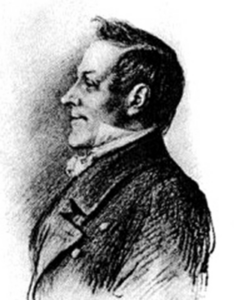After a thunderstorm
(Poet's title: Nach einem Gewitter)
Set by Schubert:
D 561
[May 1817]
Auf den Blumen flimmern Perlen,
Philomelens Klagen fließen,
Mutiger nun dunkle Erlen
In die reinen Lüfte sprießen.
Und dem Tale, so erblichen,
Kehret holde Röte wieder,
Und in der Blüten Wohlgerüche
Baden Vögel ihr Gefieder.
Hat die Brust sich ausgewittert,
Seitwärts lehnt der Gott den Bogen,
Und sein golden Antlitz zittert
Reiner auf versöhnten Wogen.
Pearls are shimmering on the flowers,
Philomel’s laments are pouring out;
Dark alder trees are now more courageous
As they shoot up into the pure air.
And into the valley, which had become so pale,
The beautiful red colouring returns,
And in the lovely fragrance of the blossom
Birds are bathing their feathers.
Having got the storm off his chest
The god lays his bow aside –
And his golden face trembles
More purely over the placated waves.
All translations into English that appear on this website, unless otherwise stated, are by Malcolm Wren. You are free to use them on condition that you acknowledge Malcolm Wren as the translator and schubertsong.uk as the source. Unless otherwise stated, the comments and essays that appear after the texts and translations are by Malcolm Wren and are © Copyright.
☙
Themes and images in this text:
Air Alder trees Apollo / Phoebus Birds Bows and arrows Chest / breast Courage Evening and the setting sun Faces Fading and losing colour Feathers and plumage Flowers Jupiter / Zeus Gold Laments, elegies and mourning Nightingales, Philomel Pearls Pouring, scattering and strewing Rain Red and purple Smells Storms Valleys Waves – Woge
The air has cleared and the atmosphere is getting back to normal, allowing us to appreciate the world in a fresh way. The raindrops are glistening like pearls and the nightingale’s song takes on its full intensity. Scents and colours are more insistent and we become aware of the daring and courage of the surrounding alder trees. It takes the disruption a storm to reveal such a world to us.
The final image of Mayrhofer’s poem points to the emotional as well as the metereological phenomenon that we are dealing with. The sun turns golden in the sunset (we have already noted that the valley is getting redder) and is reflected in the shimmering, placated (or pacified) waves. The sun is said to be the trembling face of a god (Apollo, the sun god? Jupiter, the god of thunderstorms?), who has now put aside his bow, having got the storm off his chest. We all know the experience. Sometimes things just build up and the tension simply has to burst out. It is impossible for humans to experience a thunderstorm as an objective phenomenon limited to the realm of wind, water, lightning and thunder. For us, it is inevitably connected with pressure, release, anger and resolution. Indeed we have very little language to describe our emotions without using the metaphors of intense weather: we storm out, we thunder our disapproval, we have blazing rows. We have fewer phrases for making sense of the moments of calm and release which follow the outburst, which is one of the reasons why Mayrhofer’s poem is so evocative. We realise that there is no need to give a name to the storm god (Thunderer, Zeus, Jehovah etc.) since the storms that matter to us come from inside us and the calm which follows the storm can assuage the waves within.
☙
Original Spelling and notes on the text Nach einem Gewitter Auf den Blumen flimmern Perlen, Philomelens Klagen fließen; Muthiger nun dunkle Erlen In die reinen1 Lüfte sprießen. Und dem Thale, so erblichen, Kehret holde Röthe wieder, Und in der Blüten Wohlgerüchen2 Baden Vögel ihr Gefieder. Hat die Brust sich ausgewittert, Seitwärts lehnt der Gott den Bogen - Und sein golden Antlitz zittert Reiner auf versöhnten Wogen. 1 When Mayrhofer published this poem in 1824 the word here was 'blauen' (blue). It is impossible to know if Schubert made the change himself or if he was working from an earlier version of the text. 2 Mayrhofer 1824: Und in duftigen Gerüchen (And in fragrant odours)
Confirmed by Peter Rastl with Gedichte von Johann Mayrhofer. Wien. Bey Friedrich Volke. 1824, page 28; and with Gedichte von Johann Mayrhofer. Neue Sammlung. Aus dessen Nachlasse mit Biographie und Vorwort herausgegeben von Ernst Freih. v. Feuchtersleben. Wien, 1843. Verlag von Ignaz Klang, Buchhändler, page 127 (here with the title Nach dem Gewitter).
To see an early edition of the text, go to page 28 [42 von 212] here: http://digital.onb.ac.at/OnbViewer/viewer.faces?doc=ABO_%2BZ177450902


